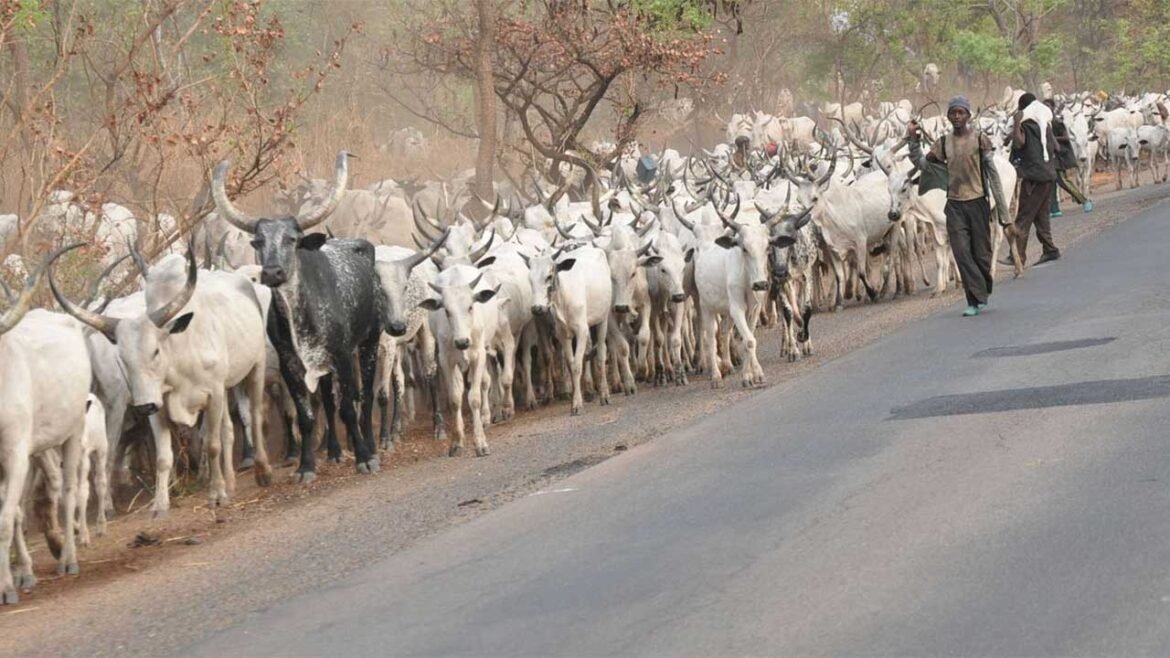Now that the Ruganisation of Nigeria as a policy of the Buhari administration has suffered a life-threatening seizure, we need to address why we are in this position to begin with.
The beef of the matter is our need for meat – for that is why we have Fulani herdsmen in our midst– and the bone of it is that we produce this food in a primitive and unsustainable way.
The meat production industry in Nigeria is primeval, undeveloped and untapped. We have herdsmen roaming the streets as if it is 800 BC.
Herdsmen travel hundreds of kilometers in search of pasture and, finding it difficult to get green plants in the Sahel vegetation, become tired and forcefully encroach upon private farmlands and other properties.
Unchecked, Fulani herdsmen grew desperate and bold.
They exchanged crooks with AK-47 rifles. As if that was not bad enough, they won the sympathy of a President who happens to be a Fulani cattle pastoralist.
Instead of taking the guns from them, he arrayed the instrument of state to back up his kinsmen, instilling a threat of occupation in the minds of other Nigerians.
Fear transitioned from the Fulani pastoralists to the eaters of their meat. Meat customers, from Jos to Yenagoa, are now up in arms against the widening of the Hausa-Fulani hemisphere
Eventually, the armed herdsmen found other uses for their guns, such as kidnapping, murder and rape.
And as they engaged in criminal activities, the nation went on a downward spiral of insecurity. Fear transitioned from the Fulani pastoralists to the eaters of their meat.
Meat customers, from Jos to Yenagoa, are now up in arms against the widening of the Hausa-Fulani hemisphere.
Yet, the matter should be all about meat and how we produce it.
Unlike some societies, no major Nigerian religion forbids the consumption of meat. Vegetarianism is fringe and non-reflective of the population.
We just love meat. It has been estimated that in Lagos State alone, 10,000 cows worth two billion naira are slaughtered per day. The demand is huge and the market is strong.
Almost all of the meat is produced by the Fulani herdsmen who, with all they do, are unable to meet the demand. Fulanis animals are famished, hungry and thin.
The price of meat as a ratio of per capita income is high. Most Nigerians children can barely get more than one tiny piece of meat per meal except during festivities, and are deprived of essential nutrient.
Fresh diary products are non-existent. Yet, thousands of Nigerians have died to protect the Fulani cattle.
This is happening because we allowed cattle production to be run with Middle Age mechanisms, ultimately leading to a clash of two ages – medieval versus modern.
Other countries have as much need for meat and milk as Nigeria, but they have figured out a way to deliver these products efficiently, cheaply and profitably, without some rearers encroaching upon farmlands or roaming with guns
Cows now roam the streets of our cities, where they are least likely to find pasture, and Nigerians are wondering why animals are invading their space.
There are some images available on Google showing cattle being reared through the Federal Secretariat in Abuja, illustrating how senseless this situation has become.
Nigeria should never have been in a position in the 21st Century, when other nations are roaming the galaxy, where cattle should be reared near urban populations.
It is a symbol of our social and economic backwardness. We must do what other nations are doing or we will have problems that other nations have solved.
Other countries have as much need for meat and milk as Nigeria, but they have figured out a way to deliver these products efficiently, cheaply and profitably, without some rearers encroaching upon farmlands or roaming with guns.
In much of the outside world, modernised farmlands and ranches for livestock and diary is the order. In Western countries, you have to visit a farm to experience a live cow.
In spite of the segregation, beef and dairy products get to dining tables rather fast.
While most Nigerians have never had a taste of fresh milk, it finds its way to the American home from distant farms every day. Until I travelled outside of Nigeria, the only milk I knew was the canned or powdered brands.
In the US and Canada, there are about one million cattle businesses, mostly family-owned, for a population of less than 350 million.
Not only are there many people involved, they work behind the scenes and produce more beef per hour worked than the Fulani.
Brazil and Australia, which export more meat than the US and Argentina, also rely on farmlands, ranches and private enterprise. Cattle farmers either own the land or rent. In a sharp contrast to Ruga, cattle farms are not established all over the nation but are concentrated where conditions are conducive
Argentina, with a population the quarter of Nigeria’s, produces about 8 percent of the world’s meat with a total slaughter of 13 million head of cattle per year.
Their cows are kept in yards on farms with nearly disease-free ranches and year-round natural grazing. The land does not have to be owned by the farmer, as rented land accounts for 60 percent of agricultural produce.
Brazil and Australia, which export more meat than the US and Argentina, also rely on farmlands, ranches and private enterprise. Cattle farmers either own the land or rent.
In a sharp contrast to Ruga, cattle farms are not established all over the nation but are concentrated where conditions are conducive.
If President Buhari insists on the Ruga, he can encourage the home states the Fulani, where land is plentiful, to host them, and develop fast transportation to get cows to the markets in the south.
The business should be no different from the tomato and rice farms in the north, which need no Ruga.
But the Fulani herdsmen problem requires a smarter solution, as the business has been begging for modernisation and the participation of all Nigerians.
We have given excessive power to the Fulani rearers because of lack of ingenuity and business acumen; the production of cattle is not an exclusive talent of any ethnic group.
The suspension of the Ruga settlement plan does not go far enough. Ruga, the National Livestock Transformation Program and other tricks aimed at settling the Fulani through the Southern hinterland by power of state should be cancelled outright
I ask – What stops our Dangotes, Otedolas and Obasanjos from going into large-scale cattle production for local needs and the export market? What stops the Tiv, Yoruba, Edo, Igbo or Ijaw man or woman from becoming a cattle farmer?
Why can’t entrepreneurs see this as an opportunity and import Argentine and Australian breeds into a farm in Ogun, Edo, Benue or Rivers State in a massive production that will knock the Fulani herdsman off his perch?
Cattle rearing is a cash cow suited to large-scale farming, not requiring Buhari’s intervention nor the monopoly of the Fulani.
The Waggoner Ranch in Australia, valued at $725 million, is the world’s largest cattle ranch at roughly six million acres and 160,000 head of cattle.
The seventh-ranked is the King Ranch sprawling across 825,000 acres in Texas, US, home to 35,000 head.
Founder of CNN, billionaire Ted Turner owns more than two million acres of ranch land across 18 ranches in seven U.S. states and Argentina.
I am not suggesting that the Fulani cattle rearers be denied an opportunity to make a living. They have every right to exist and do legitimate cattle business.
However, they have no right to displace other people from their legally-owned land or threaten the security of the states in which they do business.
It is dismaying for the Buhari administration to hide behind some weak governors to order preferential treatment to the President’s kinsmen.
If Buhari insists on Fulani-styled cattle settlements, Southern Nigerians should be smart to invert the advantage and apply for concessions in Sokoto, Katsina, Kebbi and every other state where the Fulanis have their ancestral land
. Southerners can turn the table against this abominable plan by the ruling government, and produce meat for all by modern techniques. It is time for competition to thrive
The suspension of the Ruga settlement plan does not go far enough. Ruga, the National Livestock Transformation Programme and other tricks aimed at settling the Fulani through the Southern hinterland by power of state should be cancelled outright.
The function of government in any free society is to create the right environment for all citizens to engage in economic activities without discrimination.
Any Fulani who wants to engage in modern farming must buy or rent land at the discretion of their owners. Ruga is nothing but land robbery for the Fulanis. It is an obnoxious use of power by the Federal Government.
If Buhari insists on Fulani-styled cattle settlements, Southern Nigerians should be smart to invert the advantage and apply for concessions in Sokoto, Katsina, Kebbi and every other state where the Fulanis have their ancestral land.
Southerners can turn the table against this abominable plan by the ruling government, and produce meat for all by modern techniques. It is time for competition to thrive.








